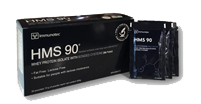International Journal of General Medicine 2011:4 105–113
Role of glutathione in immunity and inflammation in the lung.
The use of stable radioisotopes allowed the characterization of cysteine metabolism and GSH synthesis in Septic patients. This study showed that sepsis decreases blood GSH synthesis by 60%.(3) Of note, these patients had an intake of sulfur amino acids below that recommended by the World Health Organization.(3) Studies in animal models have reported an increased requirement for cysteine in sepsis, probably due to an increased turnover of GSH, as GSH synthesis accounts for 40% of the increased cysteine utilization.(11,12) These and other studies show that even when the dietary intake of cysteine is sufficient for protein synthesis (nitrogen balance), it may not be sufficient to maintain adequate GSH levels.(9) One should also bear in mind that infectious and inflammatory conditions are associated with an increased production of acute-phase proteins by the liver, and it was estimated that they account significantly for the increased utilization of sulfur amino acids, thus competing with GSH.(13,14)
GSH is essential for innate and adaptive immune functions. The functions of GSH are not only inhibitory as described above for the inflammatory response. In fact, GSH is essential for some functions of the immune system, both innate and adaptive, including T-lymphocyte proliferation,(38,39) phagocytic activity of polymorphonuclear neutrophils (PMN),(40) and dendritic cell functions,(41) and is also important for the first step of adaptive immunity, consisting of the antigen presentation by antigen-presenting cells (APC). Indeed, cell-mediated immunity requires that protein antigens be first degraded in the endocytic vesicles of APCs (eg, macrophages, dendritic cells), so that the smaller peptides can be presented on the cell surface by the major histocompatibility complex to activate proliferation of antigen-specific T cells. One of the first steps in antigen degradation and processing is the reduction of disulfide bonds,(42) which requires GSH.(43) It should also be noted that although GSH inhibits the production of most inflammatory cytokines, it is required to maintain an adequate interferon gamma (IFN-gamma) production by dendritic cells,(44) which is essential for the host defense against intracellular pathogens such as mycobacteria.(45)
Role of glutathione in immunity and inflammation in the lung.
การใช้ไอโซโทปรังสีที่เสถียร (stable radioisotopes) ช่วยให้เราสามารถศึกษาคุณลักษณะพิเศษของกระบวนการสันดาปของกรดอะมิโนซีสเตอีนและการสร้างกลูทาไธโอนในผู้ป่วยที่เกิดภาวะพิษเหตุติดเชื้อ (ภาวะการอักเสบทั่วร่างกายร่วมกับการติดเชื้อหรือ sepsis) ได้ การศึกษาวิจัยนี้แสดงให้เห็นว่าภาวะพิษเหตุติดเชื้อลดอัตราสร้าง
กลูทาไธโอนในเลือดลงถึง 60% และเป็นที่น่าสังเกตุว่าผู้ป่วยกลุ่มนี้รับประทานอาหารที่มีส่วนประกอบของกรดอะมิโนซีสเตอีนต่ำกว่าระดับที่แนะนำโดยองค์การอนามัยโลก การศึกษาในสัตว์ทดลองพบว่าความต้องการกรดอะมิโน
ซีสเตอีนสูงขึ้นในภาวะพิษเหตุติดเชื้อซึ่งน่าจะเกิดจากอัตราการใช้กลูทาไธโอนที่สูงขึ้น ทั้งนี้เนื่องจาก 40% ของปริมาณการใช้กรดอะมิโนซีสเตอีนที่เพิ่มขึ้นถูกนำไปใช้ในการสร้างกลูทาไธโอน หลายการศึกษาวิจัยรวมทั้งการวิจัยครั้งนี้แสดงให้เห็นว่าแม้คนเราจะได้รับกรดอะมิโนซีสเตอีนจากอาหารในปริมาณที่เพียงพอกับการสร้างโปรตีนโดยทั่วๆ ไป (เพื่อคงสมดุลสารไนโตรเจนในร่างกาย) แต่ปริมาณดังกล่าวอาจไม่เพียงพอกับการรักษากลูทาไธโอนให้อยู่ในระดับที่เหมาะสม เราควรตระหนักด้วยว่าในภาวะที่ร่างกายเกิดการติดเชื้อหรือเกิดการอักเสบ ตับจะตอบสนองโดยผลิตสารโปรตีนในระยะเฉียบพลัน (acute-phase proteins) มีการประเมินว่าการสร้างโปรตีนในระยะเฉียบพลันนี้เองที่ก่อให้เกิดความต้องการกรดอะมิโนซีสเตอีนในปริมาณสูงและแย่งปริมาณซีสเตอีนที่ปกติต้องนำไปใช้ในการสร้าง
กลูทาไธโอน
กลูทาไธโอนมีความจำเป็นอย่างมากต่อการทำงานของระบบภูมิคุ้มกันทั้งแบบไม่จำเพาะ (innate immune response) และแบบเจาะจงแอนทีเจน (adaptive immune response) บทบาทของกลูทาไธโอนต่อภูมิคุ้มกันไม่ได้จำกัดอยู่แค่การสกัดกั้นการเกิดการอักเสบเท่านั้นแต่มีความจำเป็นต่อการปฏิบัติงานหลายขั้นตอนของระบบภูมิคุ้มกันทั้งประเภท innate immune response หรือ adaptive immune response รวมถึงการผลัดเซลล์เม็ดเลือดขาว
ที-ลิมโฟไซต์ (T-lymphocytes หรือT-cells) การกินสิ่งแปลกปลอมของเซลล์เม็ดเลือดขาวนูโตรฟิล (neutrophils) และการทำงานของเซลล์สนับสนุนภูมิคุ้มกันเดนไดรติค (dendritic cells) และยังมีความสำคัญกับปฏิกิริยาโต้ตอบช่วงแรกของระบบภูมิคุ้มกันแบบ adaptive immune response นั่นคือกระบวนการแสดงแอนติเจนของสารแปลกปลอมหรือเชื้อโรคบนผิวของเซลล์นำเสนอแอนติเจน (antigen-presenting cells หรือ APC) โดยแท้จริงแล้วการทำงานของภูมิคุ้มกันแบบตอบสนองโดยอาศัยเซลล์ (cell-mediated immunity) จำเป็นต้องอาศัยการย่อยสลายโปรตีนแอนติเจนของสารแปลกปลอมโดยเซลล์นำเสนอแอนติเจน (เช่น macrophages และ dendritic cells) เพื่อให้โมเลกุลโปรตีนมีขนาดเล็กพอที่จะถูกนำขึ้นจัดวางบนพื้นผิวเซลล์เพื่อส่งสัญญาณและกระตุ้นเซลล์เม็ดเลือดขาว
ที-ลิมโฟไซต์ให้ผลิตเม็ดเลือดขาวขึ้นเป็นจำนวนมากเพื่อต่อต้านแอนติเจนของสิ่งแปลกปลอมชนิดนั้นๆ ทั้งนี้ขั้นตอนแรกในการสลายและเตรียมโปรตีนแอนติเจนคือการทำให้เกิดปฏิกิริยารีดักชั่นของพันธะโมเลกุลกำมะถันคู่ (reduction of disulfide bonds) ซึ่งจำเป็นต้องใช้กลูทาไธโอน เป็นที่น่าสังเกตุว่าถึงแม้กลูทาไธโอนจะช่วยยับยั้งการผลิตสารก่อการอักเสบส่วนใหญ่ แต่กลูทาไธโอนก็ยังมีความจำเป็นต่อการคงระดับการผลิตสาร interferon gamma (IFN-gamma) ที่เพียงพอของเซลล์เดนไดรติคซึ่งจำเป็นต่อการต่อต้านเชื้อโรคที่ผ่านเข้าไปภายในเซลล์ เช่น ไมโคแบคทีเรีย
The use of stable radioisotopes allowed the characterization of cysteine metabolism and GSH synthesis in Septic patients. This study showed that sepsis decreases blood GSH synthesis by 60%.(3) Of note, these patients had an intake of sulfur amino acids below that recommended by the World Health Organization.(3) Studies in animal models have reported an increased requirement for cysteine in sepsis, probably due to an increased turnover of GSH, as GSH synthesis accounts for 40% of the increased cysteine utilization.(11,12) These and other studies show that even when the dietary intake of cysteine is sufficient for protein synthesis (nitrogen balance), it may not be sufficient to maintain adequate GSH levels.(9) One should also bear in mind that infectious and inflammatory conditions are associated with an increased production of acute-phase proteins by the liver, and it was estimated that they account significantly for the increased utilization of sulfur amino acids, thus competing with GSH.(13,14)
GSH is essential for innate and adaptive immune functions. The functions of GSH are not only inhibitory as described above for the inflammatory response. In fact, GSH is essential for some functions of the immune system, both innate and adaptive, including T-lymphocyte proliferation,(38,39) phagocytic activity of polymorphonuclear neutrophils (PMN),(40) and dendritic cell functions,(41) and is also important for the first step of adaptive immunity, consisting of the antigen presentation by antigen-presenting cells (APC). Indeed, cell-mediated immunity requires that protein antigens be first degraded in the endocytic vesicles of APCs (eg, macrophages, dendritic cells), so that the smaller peptides can be presented on the cell surface by the major histocompatibility complex to activate proliferation of antigen-specific T cells. One of the first steps in antigen degradation and processing is the reduction of disulfide bonds,(42) which requires GSH.(43) It should also be noted that although GSH inhibits the production of most inflammatory cytokines, it is required to maintain an adequate interferon gamma (IFN-gamma) production by dendritic cells,(44) which is essential for the host defense against intracellular pathogens such as mycobacteria.(45)
HMS 90®
Contact Details
บริษัท อิมมูโนไทย จำกัด245/4 ถ.สุขุมวิท 21 (อโศก) แขวงคลองเตยเหนือ เขตวัฒนา กรุงเทพฯ 10110092-696-6925info@immunothai.co.th

